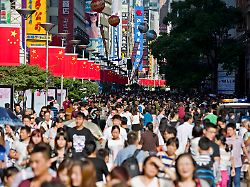“Feelings of the nation” hurt?
Beijing declares war on “wrong” clothing
By Leah Nowak
September 13, 2023, 2:03 p.m
Listen to article
This audio version was artificially generated. More info | Send feedback
Fearing “subversive” forces in their own country, the Chinese government is striking again. A legal reform is intended to ban certain items of clothing from public view in the future. However, no one knows exactly which wardrobe violates the “spirit of China”.
Uniform, miniskirt or traditional robe: style is a question of taste, and not every piece of clothing meets the taste of the Chinese government. An amendment to the law should now specify in more detail what the wardrobe of the population in their own country should look like.
The Standing Committee of the National People’s Congress, part of China’s legislature, has published a stricter law on its website that criminalizes the wearing of certain items of clothing. The draft, which is intended to renew several parts of the previous criminal law for the “management of public security”, does not only criminalize the wardrobe of individuals. Free speech is once again becoming a target for the Chinese government.
According to clause 34 of the amendment, anyone who “undermines the spirit of China” or “hurts the feelings of the nation” through their choice of clothing can be prosecuted. According to the US television network CNN The new regulation follows a series of measures that are directed against the expression and style of individual people. New broadcasting regulations from recent years have already banned artists “with a female style” from TV shows. Likewise, tattoos or men with body decorations have always been considered outlawed in China’s public sector.
There had been increasing number of disputes in the past. An example: Last week, according to the “New York Times” in the city of Shenzhen warned a man who was broadcasting livestreams while wearing a miniskirt. “A man who wears a skirt in public – do you think you have positive energy?” one of the police officers had shouted at the man.
Who determines the “feeling of the nation”?
However, it is not clear from the text of the law which type of clothing should fall under the new ban. Terms such as “spirit of the nation” and “popular feeling” are not subject to any further specification. Process sequences are also not defined in more detail. The interpretation of the legal text would therefore fall within the discretion of the security authorities, which could further increase arbitrariness in the areas of law enforcement and justice. If the current draft law is enacted, there is a risk of fines of up to 5,000 yuan (around 637 euros) or police custody of up to 15 days. It is not the first time that Chinese lawmakers have used empty phrases and flexible definitions. Hong Kong’s 2020 security law also caused great uncertainty because of its extremely broad wording.
According to the New York Times, the planned ban could catapult China into the ranks of the most socially conservative countries. Be on social media already warned of the “intervention of the moral police”. A look at the Japanese-Chinese tensions gives the planned tightening additional political weight. “The change could stoke extreme nationalism and increase antagonism with some countries,” criminal law professor Lao Dongyan of Tsinghua University in Beijing told CNN. In particular, wearing traditional Japanese clothing could be interpreted as a subversive provocation. According to the New York Times, a woman in the city of Suzhou was temporarily arrested last year for wearing a kimono.
Before deciding whether to implement the proposed changes, Chinese lawmakers want to obtain feedback. Opinions and suggestions for improvement can be submitted on the National People’s Congress website until September 30.
